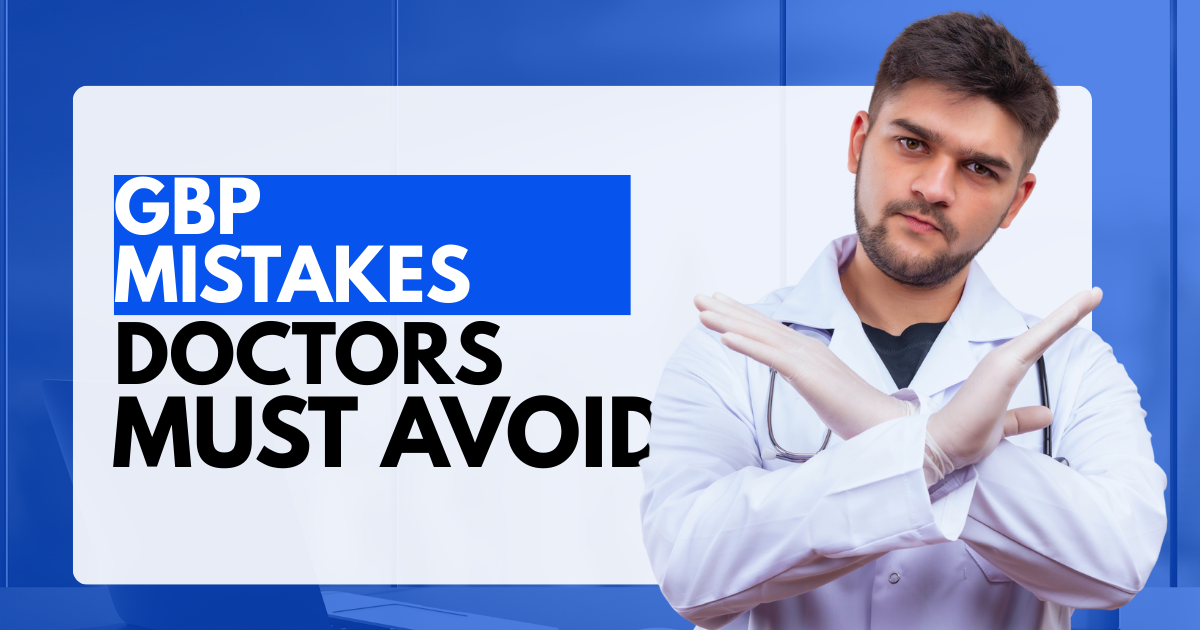For doctors, clinics, and healthcare providers in the United States, having a strong Google Business Profile (GBP) is one of the most important steps in attracting new patients. Whether you’re an internal medicine practice in NYC or a chiropractor in Houston, most patients will find you first through Google Search or Google Maps. That’s why Google Business Profile optimization is not optional—it’s the foundation of effective Medical SEO Services.
Unfortunately, many practices make common Google Business Profile mistakes for doctors, such as incomplete profiles, outdated information, or poor category choices. These errors directly reduce online visibility and can prevent your practice from appearing in the local 3-Pack, where most patients click when searching for nearby doctors. For example, if you’re asking yourself, “How to rank my primary care clinic in Houston on Google?”—the answer often starts with avoiding these GBP missteps.
The impact goes beyond rankings. A missing phone number or broken booking link can cost real patient calls and appointments. In competitive cities like Los Angeles, Chicago, or San Diego, even small errors in your profile can mean patients choose another provider instead of you.
In this guide, we’ll break down the most common GBP mistakes that hurt doctors’ local SEO, show how they affect patient acquisition, and explain how Medical SEO Services can fix them to maximize visibility and bookings.

Incomplete or Inaccurate Business Information
One of the most damaging mistakes doctors and clinics make with their Google Business Profile (GBP) is failing to keep business information accurate and consistent. Something as simple as a wrong phone number, an outdated address, or mismatched clinic details across directories can seriously impact both Medical Local SEO and patient trust.
When patients search online for a provider, they expect instant accuracy. If your cardiology clinic in Chicago or pediatric practice in San Diego has incorrect information listed, potential patients may either call the wrong number or show up at the wrong address. This not only creates frustration but also weakens your credibility. For example, an internal medicine practice in NYC with outdated contact information may fail to appear in local searches entirely—causing a direct loss in new patient opportunities.
Why Consistency Matters for Local SEO
Google uses a clinic’s Name, Address, and Phone Number (NAP) as critical ranking signals for local searches. When this data is inconsistent across platforms—like your website, GBP, social profiles, and third-party directories—Google becomes uncertain about your practice’s legitimacy. This lowers your chances of ranking in the Local 3-Pack, where most patients click first.
A detailed Medical Website SEO Audit can uncover these inconsistencies and help practices fix them quickly. Whether it’s correcting a typo in your phone number or ensuring your practice hours match across listings, small fixes can deliver significant improvements in local visibility.
Patient Trust and First Impressions
Beyond search rankings, accurate business information is directly tied to patient confidence. Imagine a patient in Houston searching for “chronic care management SEO Houston” and clicking on your profile—only to find a disconnected phone line. Most won’t try again; they’ll move on to the next provider. This is where precision matters.
Aligning GBP With Broader Medical SEO
Fixing business details in your GBP should not happen in isolation. It must align with your broader Medical SEO strategy. By pairing GBP optimization with Local SEO for Healthcare Providers, you can build authority, increase local visibility, and make it easy for patients across cities like Los Angeles, Dallas, or Philadelphia to find and contact you.
Correcting business information may sound simple, but in highly competitive healthcare markets, it can be the difference between ranking above your competitors—or losing patients to them.
Neglecting Categories and Services Setup
Your main category plays a crucial role as a key ranking factor in Google Business Profile Optimization. These two elements tell Google what your practice specializes in and help connect you with patients searching for those services. If they’re missing or inaccurate, your visibility drops dramatically.
The Problem With Wrong Categories
The primary category is one of the most important ranking factors in Google Business Profile Optimization. If a cardiologist in Chicago accidentally selects “consultant” instead of “cardiologist,” they risk being invisible to patients searching for “cardiologist SEO expert Chicago.” Similarly, a pain management clinic in Los Angeles that picks “medical office” as its main category may lose out on more specific searches like “pain management SEO agency Los Angeles.”
Missing Services Hurt Patient Discovery
Beyond categories, listing specific services is equally critical. Patients often search for exact care types such as “pediatric care,” “telemedicine,” or “fertility clinic SEO expert Chicago.” If your GBP is missing these services, you won’t appear in those results. For instance, an OB/GYN clinic in Phoenix that fails to include “prenatal care” or “telemedicine appointments” may not show up when patients search “OB/GYN SEO services in Phoenix.”
Building Stronger Service Visibility
Properly categorizing and listing services also enhances your profile’s relevance when combined with an optimized business description. For example, a neurology practice in San Antonio can highlight treatments like epilepsy care, migraine management, or remote consultations. Google matches these services to patient intent, improving the clinic’s chance of ranking in both the Local Pack and Maps. To ensure your profile captures every opportunity, review our guide on writing a compelling Business Description for Medical SEO.
Why This Matters for Medical SEO
When categories and services are neglected, your GBP doesn’t reflect the full scope of your expertise. This means losing patients to competitors who took the time to set theirs up correctly. By getting categories and services right, you not only boost Medical SEO visibility but also make it easier for patients in cities like San Diego, Dallas, or Jacksonville to find exactly what they need.
In short: don’t let a wrong click or overlooked service limit your clinic’s growth.
Poor Photo, Video, and Content Strategy
Many doctors and clinics underestimate how much photos, videos, and content matter on a Google Business Profile (GBP). Patients in the United States often decide which healthcare provider to contact based on first impressions online. If your profile has poor-quality images, no videos, or generic content, it immediately reduces engagement and trust.
Why Photos Matter for Patient Trust
A clinic with blurry waiting room photos or no team images at all may appear unprofessional. On the other hand, high-quality photos of your facility, staff, and services create transparency. Patients searching for “orthopedic surgeon SEO marketing Dallas” or “San Diego ophthalmology clinic local SEO” are far more likely to call when they can see the people and environment behind the practice. Missing or outdated photos not only discourage patients but also hurt click-through rates, which indirectly impacts Medical Local SEO.
Missed Opportunities With Videos
Videos add another layer of credibility. A short walk-through of your facility, an introduction from the lead doctor, or a quick explainer on services like telemedicine can make your practice stand out. For example, a Los Angeles clinic working with a telemedicine SEO expert that uploads patient education videos is more likely to rank higher and convert better than a competitor with no video content. Patients prefer to see a doctor they can trust before booking an appointment, especially in large cities like NYC, Houston, or Phoenix.
Importance of Healthcare Branding in GBP
A consistent healthcare branding strategy ensures your GBP reflects your practice’s values, specialties, and professionalism. It’s not enough to upload random content — it needs to align with your brand identity. For example, a fertility clinic in Chicago can use branded images and videos to show compassion and expertise, helping attract more patients searching for “fertility clinic SEO expert Chicago.” Learn more about shaping a consistent brand presence with our detailed guide on Healthcare Branding.
Using HealthCare Content Marketing for Better Visibility
Another overlooked factor is Healthcare content marketing within GBP. Many clinics fail to use posts or descriptions to educate and engage patients. A cardiologist in Philadelphia could share content about heart health tips, while a nutritionist in San Diego might post healthy meal guides. These updates not only engage patients but also send fresh relevance signals to Google. For example, when a Los Angeles clinic invests in telemedicine SEO and adds patient education videos, it increases engagement, visibility, and trust.
If you’re unsure how to build the right message, professional Medical Content Writing can help craft content that resonates with both patients and search engines. Pair this with regular engagement strategies like Google Posts, and your profile becomes an active part of your overall Medical SEO strategy.
The SEO Impact of Visual & Content Gaps
When doctors, dentists, or specialists ignore photos, videos, and Healthcare content Marketing updates, they risk losing patients to competitors who showcase their expertise better. Patients searching for services like “psychiatrist digital marketing NYC” or “pain management SEO agency Los Angeles” want to see proof of credibility before making contact.
In short, a strong visual and content strategy on GBP is more than aesthetics — it’s a powerful trust-building and ranking tool that directly supports your clinic’s patient acquisition goals.
Ignoring Patient Reviews & Reputation Management
Patient reviews are one of the most influential factors in Google Business Profile (GBP) performance, yet many doctors and clinics overlook them. Reviews serve as modern-day word-of-mouth, shaping both how patients view your practice and how Google ranks it in local search. When reviews are ignored—or worse, when providers fail to respond at all—clinics miss out on critical trust-building and visibility opportunities.
Why Review Engagement Matters
Not responding to reviews can make patients feel undervalued. For instance, a Philadelphia endocrinologist who receives positive feedback but never acknowledges it misses the chance to reinforce patient loyalty. Similarly, if a patient leaves a negative review about wait times or staff courtesy and receives no response, the silence signals a lack of care. In competitive healthcare markets, this can push patients toward a competitor who appears more attentive.
Reviews and Medical Local SEO Rankings
Beyond patient perception, reviews directly influence medical local SEO rankings. Google considers both review volume and response rate as signals of credibility. A San Antonio neurologist who ignores patient feedback not only risks losing patient trust but also decreases their chance of ranking in the local 3-Pack—where most patients click first. Consistently earning reviews and responding thoughtfully can improve visibility, engagement, and calls from GBP.
Reputation Management as a Growth Strategy
Handling reviews goes beyond damage control—it’s about showcasing your practice as reliable and centered on patient care. A clinic that builds a strategy around requesting reviews, thanking patients, and addressing concerns shows commitment to quality care. Over time, this creates a steady stream of social proof that drives new patient acquisition. Clinics that invest in professional Online Reputation Management for Doctors often see improved rankings, more calls, and increased bookings.
Reviews as a Ranking Lever
Reviews are a ranking factor in Medical Local SEO.A practice with dozens of authentic, well-managed reviews is far more likely to appear when patients search for services like “pediatric endocrinologist near me” or “neurologist SEO San Antonio.” Understanding how reviews tie into rankings is critical, and our guide on Patient Reviews in Local Rankings explains this connection in detail.
Missed Opportunities in Healthcare SEO
Doctors who ignore reviews miss multiple growth opportunities:
- Lost trust: Patients assume the clinic is indifferent.
- Lower visibility: Fewer reviews = weaker SEO signals.
- Fewer conversions: Competitors with better engagement win the call or booking.
Simply put, reviews aren’t optional—they’re a cornerstone of patient acquisition and Medical local SEO success. By actively managing feedback, doctors and clinics not only strengthen reputation but also gain a measurable edge in rankings and patient trust.
Missing Tracking & Integration With Websites
One of the most overlooked mistakes doctors and clinics make with their Google Business Profile (GBP) is failing to track activity and integrate it with their website optimization. Without proper tracking methods—like UTM tags and dedicated call tracking numbers—valuable data is lost. This makes it nearly impossible to know which campaigns generate patient calls, appointment requests, or bookings.
Another issue is that many clinics keep their GBP siloed instead of syncing it with their medical websites. This disconnect means missed opportunities for visibility, accurate reporting, and a seamless patient journey. Proper integration ensures that your GBP not only attracts patients but also directly supports your broader Medical Website Optimization strategy.
Using Schema Markup for Doctors
A critical part of integrating GBP with a website is implementing structured data or schema markup. Schema tells search engines exactly who you are, what services you provide, and how patients can contact you. For instance, a dentist in Chicago who uses schema for services like “cosmetic dentistry” or “emergency care” gives Google clearer signals, which improves local rankings and click-through rates. Adding schema markup also enhances the display of rich snippets, which boosts credibility and trust. To learn more about applying these techniques, check out our guide on On-Page for Medical Website Optimization.
Connecting to Appointment Scheduling Tools
Today’s patients expect convenience. If your GBP doesn’t link to booking systems like Zocdoc, Calendly, or a custom scheduling tool, you’re adding friction to the patient journey. For example, a San Diego ophthalmology clinic that integrates online booking directly from GBP will capture more patients searching for “ophthalmologist near me” who prefer instant scheduling. Without integration, patients may abandon the search or turn to a competitor offering easier access. Embedding scheduling options creates a seamless pathway from search to conversion, reducing drop-offs and wasted opportunities.
Aligning GBP Data With Analytics
Another major issue is ignoring how GBP performance aligns with overall analytics. Calls, direction requests, and bookings captured in GBP should connect with tools like Google Analytics or custom dashboards. This alignment shows which keywords, posts, or campaigns lead to real patient actions. For example, a Houston primary care clinic might discover that “walk-in clinic near me” drives more phone calls than “family physician Houston.” By syncing GBP data with analytics, clinics can optimize resources for the highest return. For a deeper dive into aligning your data and reporting, see our Analytics and Results guide.
Why Tracking & Integration Matter
Without UTM tags, call tracking, schema, or analytics integration, practices operate blindly. This often results in wasted ad spend, lost leads, and poor decision-making. A clinic might think their Facebook campaign is working, when in reality, most patient calls are coming from GBP searches. Tracking clarifies which channels drive results, allowing practices to double down on what works.
If your practice is struggling with visibility, conversions, or accurate reporting, it’s time to revisit your tracking setup. Our guide on Tracking Calls and Bookings from Google Business Profile provides step-by-step insights to ensure no lead slips through the cracks.
In short, GBP is not just a listing — it’s a powerful patient acquisition tool. But without proper integration and tracking, its potential goes untapped. By connecting GBP to your website, analytics, and scheduling tools, you create a system that drives measurable growth and long-term patient trust.
How OctalFox Helps Avoid Google Business Profile Mistakes for Doctors
At OctalFox, we specialize in helping doctors, clinics, and healthcare providers avoid the most common Google Business Profile (GBP) mistakes that limit patient acquisition. Our approach combines Medical SEO Services with targeted GBP optimization, ensuring your practice not only shows up in search but also converts patient interest into appointments.
Tailored SEO for Healthcare Providers
Every medical practice has unique needs, and a one-size-fits-all strategy simply doesn’t work. For example, an internal medicine practice in NYC competing in a dense healthcare market requires precision GBP optimization and keyword targeting to stand out. Similarly, an orthopedic surgeon in Dallas benefits from accurate category selection, structured data, and service visibility to capture local patients searching for specific treatments. For addiction recovery facilities, a well-optimized profile can be life-changing. An addiction rehab center in San Antonio that integrates patient reviews, booking tools, and call tracking gains the credibility and trust needed to increase admissions.
Strategic Medical SEO & GBP Optimization
Our team ensures that your GBP profile is not only complete but strategically aligned with your broader digital presence. From schema markup to appointment scheduling integration, we design systems that support measurable growth. By focusing on both technical SEO and patient experience, we help healthcare providers avoid the pitfalls of missing data, weak branding, or poor engagement strategies. Learn more about our specialized approach to Medical SEO Services.
Get Started With OctalFox
If your clinic is ready to stop losing patients to competitors and start growing with a stronger digital presence, our experts are here to help. Contact us today to discuss your strategy and see how we can transform your GBP into a patient acquisition engine. Talk to OctalFox.
About the Author
OctalFox, a Digital Studio delivering innovative solutions for healthcare and beyond.
Driving strategies that help your practice or business succeed online.
Connect with Octalfox on LinkedIn

